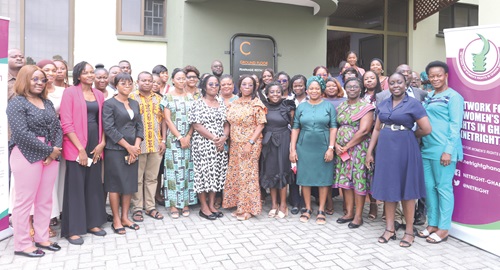The government has been urged to recognise the unseen contributions of women and girls through unpaid care work in national policy reforms.
The Executive Director of the Network for Women’s Rights in Ghana (NETRIGHT), Patricia Blankson Akakpo, who made the call, explained that unpaid Care Work (UCW), as an essential service that women provide in their various homes and communities, such as cooking, cleaning, and caring for children, the sick, and the elderly, demands their time and energy but does not come with monetary compensation, salary or allowance.
Speaking at a national consultation on unpaid care work and time poverty, she said women in Ghana unfairly bear the burden of unpaid care work, which often results in time poverty and hampers their economic empowerment.
“Unpaid care work places a heavy burden on women and girls, yet policies at the national level often fail to account for it. This neglect has serious consequences—not just for women’s rights, but for economic justice as a whole,” she said.
Mrs Akakpo emphasised that the unequal distribution of care responsibilities obstructs women’s access to education, employment, and full participation in political, social, and economic life, whilst also affecting their health and overall well-being.
Event
The national consultation was organised by NETRIGHT in partnership with Alinea International and other collaborators as part of the United for Care Sensitive Approaches to Rights and Empowerment (UCARE) project.
UCARE is a six-year initiative focused on alleviating the unequal and unjust burden of unpaid care work on women and adolescent girls in northern Ghana.
The project is being carried out in 10 districts across three regions—Northern, North-East, and Savannah—and involves national-level advocacy to rally support for policy reform.
Recommendations
The executive director outlined practical recommendations that could be incorporated into policy, including investment in time-saving technologies, affordable childcare centres near markets and workplaces, and integrating unpaid care work into district development plans.
She said these would not only ease the burden on women but also promote gender equality in access to education and employment.
“Girls miss school because they cook, fetch water and care for younger siblings. If we are truly committed to education for all, we must reduce the domestic workload that keeps them from the classroom,” she said.
Mrs Akakpo explained that the aim of the advocacy is not to demand direct payment for care work but rather to ensure that women’s contributions are recognised and supported through suitable social protection systems and public services.
“It’s not just about being paid. It’s about easing the burden. It’s about justice,” she added.
Data
The Director in Charge of the Survey and Census Organisation Directorate at Ghana Statistical Service (GSS), Abena A. Osei-Akoto, emphasised the need to conduct time-use surveys every five to 10 years, incorporate unpaid care work data into national accounting systems and promote support for care-sensitive policies.
Referring to data from the Ghana Time Use Survey (2009) and the Ghana Living Standards Survey Round 6 (NLSS 6), she stated that Ghanaian women spend nearly three times as much time as men on unpaid domestic and care responsibilities.
She revealed that 86.7 per cent of persons aged 15 and older were involved in unpaid care work.
She, however, stated that, in terms of gender, 93 per cent of women are involved in unpaid care work, compared to 80 per cent of men.

